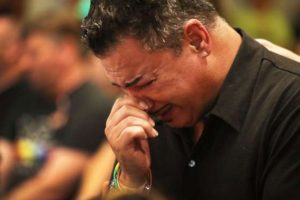Hate crime or terrorist act?
As investigators sort through the carnage at that Orlando, Fla., nightclub where Omar Mateen opened fire with his AR-15, politicians, police and pundits are wondering whether Mateen committed a hate crime or an act of terror.
I keep asking myself: What is the difference?
Suppose the shooter killed those 50 people at a grocery store, or a shopping mall. Did he hate his victims? Would he have committed a hateful act? Yes.
We’re trying to parse the language a bit too finely, it seems to me.
The massacre occurred at a club called Pulse, a popular hangout for Orlando’s gay community. Mateen supposedly saw two men engaging in a public display of affection. It set him off, according to his father. He hated what he witnessed and was intent on acting on that hatred.
OK. He’s a hater.
What if Mateen, the son of Afghan parents and a Muslim, had declared himself in league with the Islamic State and then committed an act of radical Islamic terrorism? Police say he called 9-1-1 and told the dispatcher he had pledged allegiance to ISIS. He hated his victims just much in that context as he would have hated them merely because of their sexual orientation.
He’s still a hater.
Terrorists are haters. They hate the society against which they are striking out. By extension, they hate the victims they injure and kill.
Whether they target victims for specific causes, or just to terrorize them, they are haters.
I’m still trying to grasp the gravity of what happened early this morning as they were issuing a last-call advisory at that nightclub.
I believe Mateen committed an act of terror. He also was filled with rage and hatred. Let’s avoid separating the motives. They are linked by the level of their evil intent.
